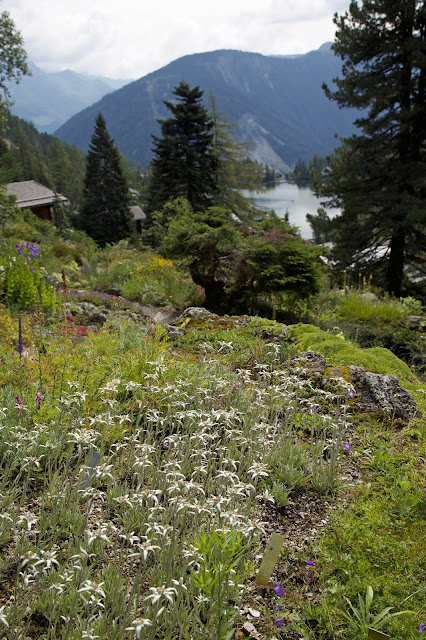 |
[Champex-Lac viewed from the La Breya chairlift] |
 |
[Edelweiss in the Flore-Alpe Gardens, Champex-Lac] |
Nevertheless we
were well rested and ready to go by the time Julie returned the next morning.
We had our familiar red bags waiting to be loaded, this time not onto the mule,
but into the van that would transport them to our next stop. And then Julie
told us about today’s walk. We wouldn’t be taking the steep and hazardous Fenêtre d’Arpette route, which would
have led us from Relais d’Arpette up
to the sharp peaks and “savage black cliffs” (as Jim Manthorpe’s guidebook puts
it) at the head of Val d’Arpette.
Some of the group had been keen to try this apparently spectacular haute route variante, especially in what
looked to be fine, settled weather. But with just one guide, and some walkers
carrying slight injuries, we had to stick together. The “softer” route via Bovine won out.
 |
[Forest walking after Relais d'Arpette] |
So instead of
ascending through rock and scree to 2600m, we sidled gently through forest
before dropping down to about 1300m. However that’s where the gentle walking
ended. We then began a long, steep ascent alongside the Durnand de la Jure stream, craning our necks to see which high
point ahead we would have to attain. We had a short respite when the track sidled
across the slope, but after crossing the stream, we began climbing again, this
time north-west and towards the tree line.
 |
[Ian and Ken on the steep climb near Durnand de la Jure] |
Our lunchtime
destination was the area known as Bovine,
and we supposed we were close when we began seeing and hearing cows and their
bells. The fortunate bovines had, for today at least, the most beautiful of
meadows to feed in: lush, flower-dotted pasture, with plentiful water. I’m not
sure whether cows appreciate views, but we certainly did. Of more interest to
them, I suppose, was their drinking vessel: a repurposed enamel bath, fully
topped up with clear mountain water. It was a little shocking to our Australian
sensibilities to see water gushing into, and then out of, the old bath, and
running away down the slope.
 |
[Our group approaches Bovine] |
Shortly after this we
turned a corner on the flank of the grassy slopes and began to approach a small
stone barn that had been turned into a kitchen/cafe, complete with outdoor
tables and umbrellas. Today they were selling biscuits, cakes, rolls, and hot
and cold drinks. What this place would be like on a wild and wet day, we
wouldn’t find out. But today it was superb: blue skies, verdant meadows, tiny
puffs of white cloud, and views past happy cows, across a deep valley, to yet another
range of high mountains.
 |
[The refuge/cafe at Alpage de Bovine] |
 |
[Happy cows and great scenery near Bovine] |
Despite the alpine
meadow feel, and the plethora of mountains, we were now seeing more signs of
population. In the valleys below us were roads, and a more densely settled
network of towns and villages. After lunch we topped out at just over 2000m and
then began a long descent through a forest of ancient larch towards the town of
Trient.
 |
[One of the ancient larches on our descent] |
As the afternoon wore on, we may have been tempted to feel a little weary,
or perhaps slightly heroic, after all our walking. But on the way down we
gained a little perspective when we passed a young mum with two little girls.
The 4 or 5 year olds were walking happily and chattily, without the slightest
complaint, up the steep track some kilometres from the start of the track.
As we wound our way
down those few kilometres we began to hear traffic, and eventually we came to
the road that joins Martigny, Trient and Vallorcine to the Chamonix valley
beyond. We’d reached the Col de la
Forclaz, and for once there was no final uphill push to our accommodation.
Right beside the road was the Hotel
Restaurant Col de la Forclaz, our more-than-comfortable home for the night.
 |
[Relaxing at Col de la Forclaz] |
No comments:
Post a Comment